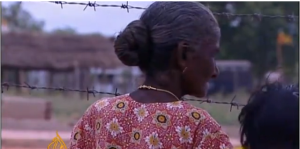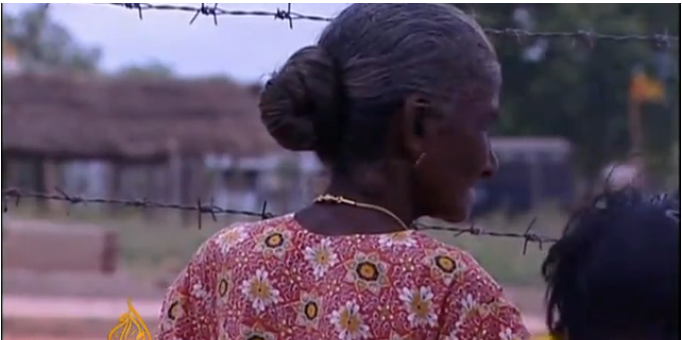 |
| ..detained in sub-standard internment camps, paid for and built by the United Nations and its donors Screen shot:Aljazeera) |
Frances Harrison
If today the United Nations announced that it had received unconfirmed reports of 50,000 casualties in a war off limits to journalists – wouldn’t the world take notice and try and stop the killings? We now know the UN system had this information in 2009 about Sri Lanka and suppressed it. We know this because of an internal review, commissioned by the UN Secretary General, Ban ki Moon.
It’s a report that concludes that the UN’s conduct at the end of the civil war in Sri Lanka marked a “grave failure” that “should not happen again”. The document cites the UN’s role in Rwanda, saying some lessons there were not learned and proved relevant to Sri Lanka. Let’s hope they’re learned for Syria, but as the author of a book of survivors’ stories from that war in Sri Lanka I am haunted by the thought of what might have been there.
The document concludes that, “in Colombo many senior staff simply did not perceive the prevention of killing of civilians as their responsibility. That’s damning criticism but it’s the nature of how and why they did this that’s very hard to accept.
The UN removed the executive summary that was present in the draft version prepared by Charles Petrie. This said, “Some have argued many deaths could have been averted had the Security Council and the Secretariat, backed by the UN country team, spoken out loudly early on, notably by publicizing casualty numbers”.
Petrie’s report meticulously documents how senior UN officials continuously tried to blame the Tamil Tiger rebels – a proscribed terrorist group – for the killings even while their own international staff told them the Sri Lankan government was responsible for the majority of deaths. It was a bias that has slanted all coverage of the conflict since because it came from such an influential and reliable source – the UN no less.
On 9 March 2009 the UN did not share with a diplomatic briefing a casualty sheet their staff had prepared, “which showed that almost all the civilians casualties recorded by the UN had reportedly been killed by Government fire”. They also failed to mention that two thirds of the killings were taking place inside “safe zones” unilaterally declared by the government, purportedly to protect civilians. Three days later the UN Resident Coordinator in Colombo, Neil Buhne, and several under-secretary generals refused to stand by their own casualty data, claiming thei were not verified. Charles Petrie puts the best gloss on the suppressing of vital casualty information, saying rather euphemistically that the briefings “fail to address the reality” on the ground.
Then when the UN High Commissioner for Human Rights, Navi Pillay, struggled to speak out about potential war crimes by the Sri Lankan government, internal communications in the annexes reveal Ban Ki Moon’s then chef de cabinet, Vijay Nambiar, strongly imploring her to tone down and dilute her statement. He even complained that her statement put the Tamil Tiger rebels and the government on the same footing. At this point Navi Pillay’s statement is quoting figures the UN knew were low – the draft version of this report mentions much higher unconfirmed reports at the time of 5,687 killed and 10,067 injured.
These were figures coming out of the war zone collected by Tamil doctors, priests, NGO workers and the UN’s local employees held hostage by the Tigers. The conflict was off limits to all independent observers so a few brave UN staff decided to set up a long distance data team in Colombo to try and corroborate the reports. They compiled casualty lists but only verified a death if there were three independent sources. The Petrie report says it was a rigorous methodology following best practice. In this way the UN confirmed nearly eight thousand civilian deaths before it became impossible in late April for people under heavy fire to get out of their bunkers and actually verify information.
Senior UN diplomats, still working in posts where they deal with conflict related issues, are cited in the report constantly trying to wriggle out of accepting the casualty data their own staff prepared, undermining it by questioning its reliability. Never mind that these figures were much more carefully checked than death tolls cited for Syria or Afghanistan. Or for that matter, the general death toll the UN always cites in official documents of 100,000 killed in Sri Lanka during the whole course of the war.
Buried in the end of the annexes of the Petrie report is startlingly new casualty information that UN staff received from informants in the field: unconfirmed reports of 17,810 killed and 36,905 injured during 2009. The UN team verified about half of these cases but knew their figure was an undercount.
Surely if the world had been told the scale of the killing at the time, international condemnation might have averted some of the deaths and abuses after the war. Subsequently a UN report has said reports of up to 40,000 civilians killed were credible. The Petrie report increases this to say 70,000 people could possibly have died in those final five months of hell.
That’s little comfort to the shattered broken survivors who watched friends and relatives die in agony, abandoned and betrayed by the international community. Starving, dirty and exhausted, they lived in ditches being pounded by multi barreled rocket fire, only getting out of flimsy shelters in the lulls in fire to bury the human body parts they found lying strewn around their tents to prevent the dogs eating them. Families were so desperate they prayed that if they were to die it would be quickly and all together; loving parents contemplated suicide with their children because they couldn’t see any chance of survival. By May 2009 people were forced to abandon their dead and injured just to save themselves, literally walking over corpses and dodging bullets. They emerged only to be detained in sub-standard internment camps, paid for and built by the United Nations and its donors.
The only way for the UN to set the record straight on Sri Lanka now is for Ban ki Moon to set up an international investigation into war crimes in Sri Lanka. It was the recommendation of a panel of experts he commissioned to write a report last year but the Secretary General hesitated to take such a step without strong international backing. We now know from this internal review that his own legal department advised him he had the power to do it, but backed off. After the revelations of this inquiry it’s an essential step to restore the UN’s tattered credibility on Sri Lanka. And it’s the very least Ban ki Moon owes the families of the tens of thousands of Tamil victims.
See this infographic chart showing what the UN knew in 2009 about casualty data and what it actually said in public. Download file Frances Harrison is a former BBC Correspondent in Sri Lanka and the author of Still Counting the Dead: Survivors of Sri Lanka’s Hidden War, published by Portobello Books (UK), House of Anansi (Canada) and Penguin ( India).
HP
